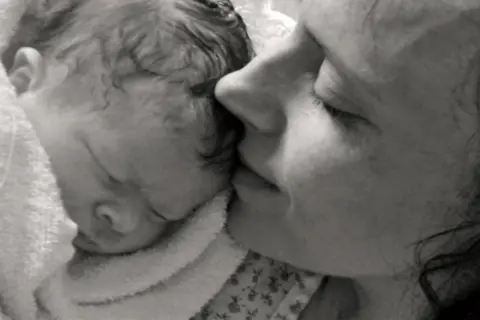Shrewsbury maternity scandal: Better care might have saved 201 babies
 Richard Stanton
Richard StantonThe number of babies who could have survived with better maternity care at Shrewsbury and Telford NHS Trust is far worse than imagined, says Jeremy Hunt.
About 201 babies might have survived had better treatment been given by the trust, the BBC has learned.
Mr Hunt, who as health secretary ordered the inquiry, said he hoped the report would be "a wake-up call".
The NHS trust has previously said it takes "full responsibility" for the failures.
Mr Hunt said the NHS had to get rid of a blame culture and "make it easy for people to speak openly".
"Even in this inquiry, doctors, midwives nurses at Shrewsbury and Telford said they were silenced, they were told that there would be professional consequences if they co-operated with the inquiry," he said.
The report would be "very, very shocking and sobering reading" Mr Hunt added and the number of deaths were "far worse" than he could have imagined at the start of the process.
He said the families who had campaigned had played "a really extraordinary role", but questioned why it had taken their efforts "rather than the NHS itself being really hungry to learn from mistakes".
"We have to get rid of that blame culture and make it easy for people to speak openly and transparently when something goes wrong," Mr Hunt said.
A report from senior midwife Donna Ockenden, who has been leading a five-year inquiry into maternity care at the trust, will be published at 10:00 BST on Wednesday.
The scale of failures uncovered is unprecedented in the history of NHS maternity care.
Significant or major concerns over the maternity care provided by the trust were found in 201 deaths - 131 stillbirths and 70 neonatal deaths.
Dozens of other children sustained life changing injuries as a result of the failure to provide adequate treatment.
The vast majority of cases date from 2000 to 2019.
Publication of the full report has twice been delayed. The NHS has been working to get indemnity cover to deal with any potential legal action following the publication.
Ms Ockenden's team has been examining 1,862 cases - thought to be the largest ever review of maternity care in the NHS.
Families in Shropshire, who campaigned for years to get an independent review into maternity failures across the county, long suspected this would be the conclusion - but the scale of the numbers involved is likely to come as a shock to many.
Rhiannon Davies said the number of deaths "do not tell the whole story" of the impact on families.
"I think you really must dig into the family details to understand the long-term, deep-seated pain and harm that has been meted out by such appallingly poor care at this trust," she said.
The trust has previously apologised and also pointed out the investment and improvements made in maternity care across the NHS in England.
A criminal investigation is being conducted by West Mercia Police into what happened at the trust.
Avoidable deaths
That the Ockenden inquiry was ordered is largely down to the work of two mothers who lost their babies due to failures of care by the trust.
Ms Davies fought for years to uncover the truth about the death of her daughter Kate in 2009. It took the board of the trust until April 2016 to apologise, and accept that Kate's death was avoidable.
Kayleigh Griffiths' baby Pippa died at 31 hours old in April 2016, and a few weeks later Ms Griffiths emailed Ms Davies hoping for advice on how to hold the trust to account.
A year later a coroner ruled that Pippa's death had also been avoidable.
The two women began to scour the internet, coroners' records and death notices to see if any other families had received poor maternity care at the Shropshire trust, and they collated 23 cases going back to 2000.
They wrote to the then health secretary Jeremy Hunt in December 2016 asking for an investigation. He agreed and in May 2017, Donna Ockenden was appointed to lead the review.
Shropshire is not the only area where maternity care has been called into question - in recent years independent investigations have been ordered into maternity services in Cumbria, East Kent, Nottingham and South Wales.
The latest Care Quality Commission (CQC) figures show 41% of units need to improve their safety, and just 1% are rated outstanding. The CQC says the rate of improvement is not good enough.
